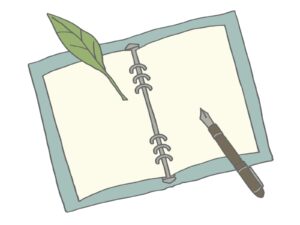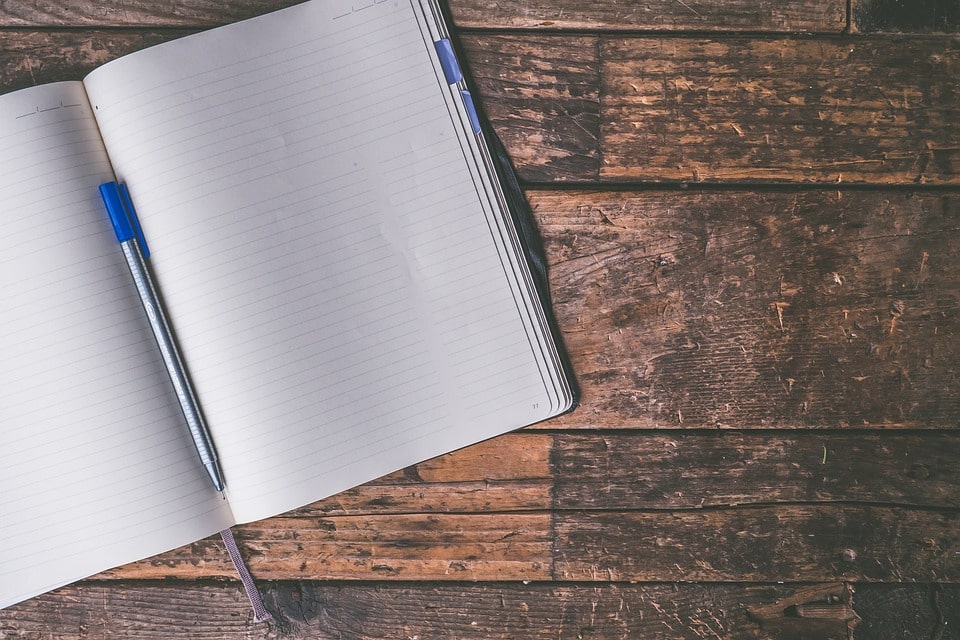Modern society is a rapidly changing and stressful environment. In such an environment, “mindfulness” is gaining attention as an effective means of maintaining a calm mind and facing oneself.
Mindfulness is the practice of being aware of and observing the here and now, and there are several notetaking techniques that utilize this practice.
This article will detail three practices that can help you achieve peace of mind: journaling, the unpleasant events calendar, and the happy things calendar.

Contents
Journaling, writing down daily thoughts and feelings
Journaling is the most basic form of mindfulness note-taking and is the first step in developing peace of mind.
By writing down thoughts, feelings, and experiences as they occur to you, you can face yourself deeply and listen to your inner voice.
Journaling is easy and can be practiced anywhere and anytime, regardless of time or location.
By writing quickly during your commute, breaks, before bed, or any other free time, you can record fragments of thoughts and emotional swings without missing a beat.
How to do Journaling
Writing in sentences rather than bullet points allows you to express in more detail the flow of thoughts and changes in emotions. Detailed descriptions are important for organizing your mind and facing your own heart.
Free Expression
It is important to write freely without worrying about correct grammar or expression. There is no need to aim for perfect writing. Rather, by writing as you wish, you can express your true feelings and latent consciousness that lurks deep within.
Concentrate on writing.
Focusing on writing keeps distractions and critical thoughts away and helps you to focus on the present moment.
Focusing on writing is important to cultivate a sense of “being here and now, ” which is the foundation of mindfulness.
Don’t judge thoughts and feelings.
Avoid criticizing or dismissing what you write down. It is important to simply observe objectively, not good or bad.
Accepting your thoughts and feelings as they are will increase your self-acceptance and lead you to peace of mind.

Effects of Journaling
Through journaling, you can objectively observe your daily thoughts and feelings and gain a deeper understanding of yourself. By organizing your mind, you can also expect to reduce stress and gain peace of mind.
Journaling is an important habit for maintaining mental health and living a more fulfilling life.
Writing down your daily thoughts and feelings can help you understand yourself better and reduce stress. It can also provide an opportunity to clarify your life purpose and values by setting aside time to face yourself.
To learn more about journaling, please see below.
Journaling (writing meditation): How to do it and why it works
Unpleasant Event Calendar” to notice negative thought patterns
One of the biggest obstacles to peace of mind is negative thought patterns. The Calendar of Unpleasant Events is an effective tool for objectively analyzing one’s own thought patterns and correcting negative thinking.
Recording Method
The unpleasant event calendar records events that you find unpleasant on a weekly basis.
- Event
- Write down specific situations (time, place, person, etc.)
- Emotions
- Describe how you felt about the event
- Write down specific emotions (anger, sadness, anxiety, etc.) and their intensity
- Thinking
- Write down what thoughts come to mind in response to the event.
- Distinguish between automatic thoughts (negative thoughts) and objective facts.
Key Points
It is important to distinguish between objective facts and subjective interpretations of events. Objective facts are information that everyone can recognize in common. Subjective interpretations, on the other hand, are interpretations based on one’s own thoughts and assumptions.
For example, in the case of an event “my boss was angry with me,” an objective fact is that “my boss gave me a warning in a harsh tone.
On the other hand, as a subjective interpretation, negative thoughts such as “I am not capable” or “My boss hates me” may come to mind.
Observe thought patterns from unpleasant events.
By keeping a calendar of unpleasant events, you can objectively analyze which situations and thought patterns make you feel uncomfortable.
For example, the following patterns may emerge
- I’m always looking for perfection.
- I am always trying to please others
- Fear of failure
- Deny yourself
Increasing Happiness: Calendar of Things That Made Me Happy
Promoting positive thinking is important to cultivate peace of mind and a sense of well-being. The Happy Moments Calendar is an effective tool for recording moments of happiness in your daily life and enhancing your sense of well-being.
How to record
The Happy Things Calendar records events that made you happy on a weekly basis.
- Happenings
- Write down specific situations (time, place, person, etc.)
- Emotions
- Write down how you felt about the event.
- Write down specific emotions (joy, gratitude, satisfaction, etc.) and their intensity
- Thinking
- Write down what thoughts came to mind in response to the event
- Write down positive thoughts and the reasons for them
Point
As with the calendar of unpleasant events, it is important to distinguish between objective facts and subjective interpretations. For example, in the case of the event “I had a good time with my family,” the objective fact would be “I had dinner with my family and watched a movie.
On the other hand, a subjective interpretation might include positive thoughts such as “I was happy with my family” or “I felt loved by my family.
Observe thought patterns from happy events.
By keeping a calendar of what made you happy, you can objectively analyze which situations and thought patterns make you feel happy.
For example, the following patterns may emerge.
- Time spent with family and friends
- Time spent doing hobbies and favorite activities
- When you are appreciated or recognized by others
- When I achieve my goals
- When you try something new
Summary
Mindfulness notes are effective for mental health stability. Please refer to the three habits introduced in this article and practice mindfulness notes in a way that suits you best.
By writing down your daily thoughts and feelings, you can gain a deeper understanding of yourself and reduce stress. In addition, by recording unpleasant and happy events, you can objectively analyze your thought patterns, which will lead you to peace of mind.
Mindfulness Notebook will become an important habit for maintaining mental health and living a more fulfilling life!




